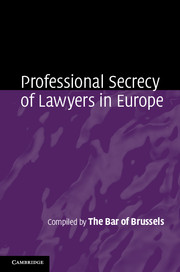Book contents
- Frontmatter
- Contents
- Contributors
- Preface
- 1 Professional secrecy in Europe
- 2 The CCBE rules on professional secrecy
- 3 Austria
- 4 Belgium
- 5 Bulgaria
- 6 Cyprus
- 7 Czech Republic
- 8 Denmark
- 9 Estonia
- 10 Finland
- 11 France
- 12 Germany
- 13 Greece
- 14 Hungary
- 15 Iceland
- 16 Ireland
- 17 Italy
- 18 Latvia
- 19 Liechtenstein
- 20 Lithuania
- 21 Luxembourg
- 22 Malta
- 23 The Netherlands
- 24 Norway
- 25 Poland
- 26 Portugal
- 27 Romania
- 28 Slovakia
- 29 Slovenia
- 30 Spain
- 31 Sweden
- 32 Switzerland
- 33 United Kingdom
- Index
24 - Norway
Published online by Cambridge University Press: 05 June 2013
- Frontmatter
- Contents
- Contributors
- Preface
- 1 Professional secrecy in Europe
- 2 The CCBE rules on professional secrecy
- 3 Austria
- 4 Belgium
- 5 Bulgaria
- 6 Cyprus
- 7 Czech Republic
- 8 Denmark
- 9 Estonia
- 10 Finland
- 11 France
- 12 Germany
- 13 Greece
- 14 Hungary
- 15 Iceland
- 16 Ireland
- 17 Italy
- 18 Latvia
- 19 Liechtenstein
- 20 Lithuania
- 21 Luxembourg
- 22 Malta
- 23 The Netherlands
- 24 Norway
- 25 Poland
- 26 Portugal
- 27 Romania
- 28 Slovakia
- 29 Slovenia
- 30 Spain
- 31 Sweden
- 32 Switzerland
- 33 United Kingdom
- Index
Summary
Preliminary note
In Norway, legal professional secrecy is regarded as a fundamental guarantee of the rule of law promoting the interests of the client, respect for the administration of justice and the laws of society. The real background to the strict duty of professional secrecy is that it makes it possible for communication between client and attorney to occur in full confidence. The duty of professional secrecy is therefore a precondition for the profession of the lawyer. It is only when the client is confident that the information provided to the lawyer will not be released to others that the lawyer can obtain the information necessary to an optimal addressing of the client's interests. The purpose of the duty of professional secrecy is thus to promote open and complete communication between attorney and client. The same factors that dictate the inviolability of the priestly confessional dictate the attorney's duty of professional secrecy. The duty of professional secrecy fulfils a deep human need. It is a part of our civilisation to put the individual's fundamental needs before the interests of the state, and this is also expressed by Article 8 of the European Convention on Human Rights.
In recent years, however, Norwegian authorities have asserted that the duty of professional secrecy prevents criminal investigation. It has also been claimed that the duty of professional secrecy prevents lawyers from fulfilling their duty of disclosure and the authorities from gaining access to lawyers’ client files. More and more people believe that the duty of professional secrecy should yield. In this regard it is important to be aware of why we have a statutory duty of professional secrecy for lawyers and to understand the intrinsic value of this right for the client.
- Type
- Chapter
- Information
- Professional Secrecy of Lawyers in Europe , pp. 392 - 411Publisher: Cambridge University PressPrint publication year: 2013



